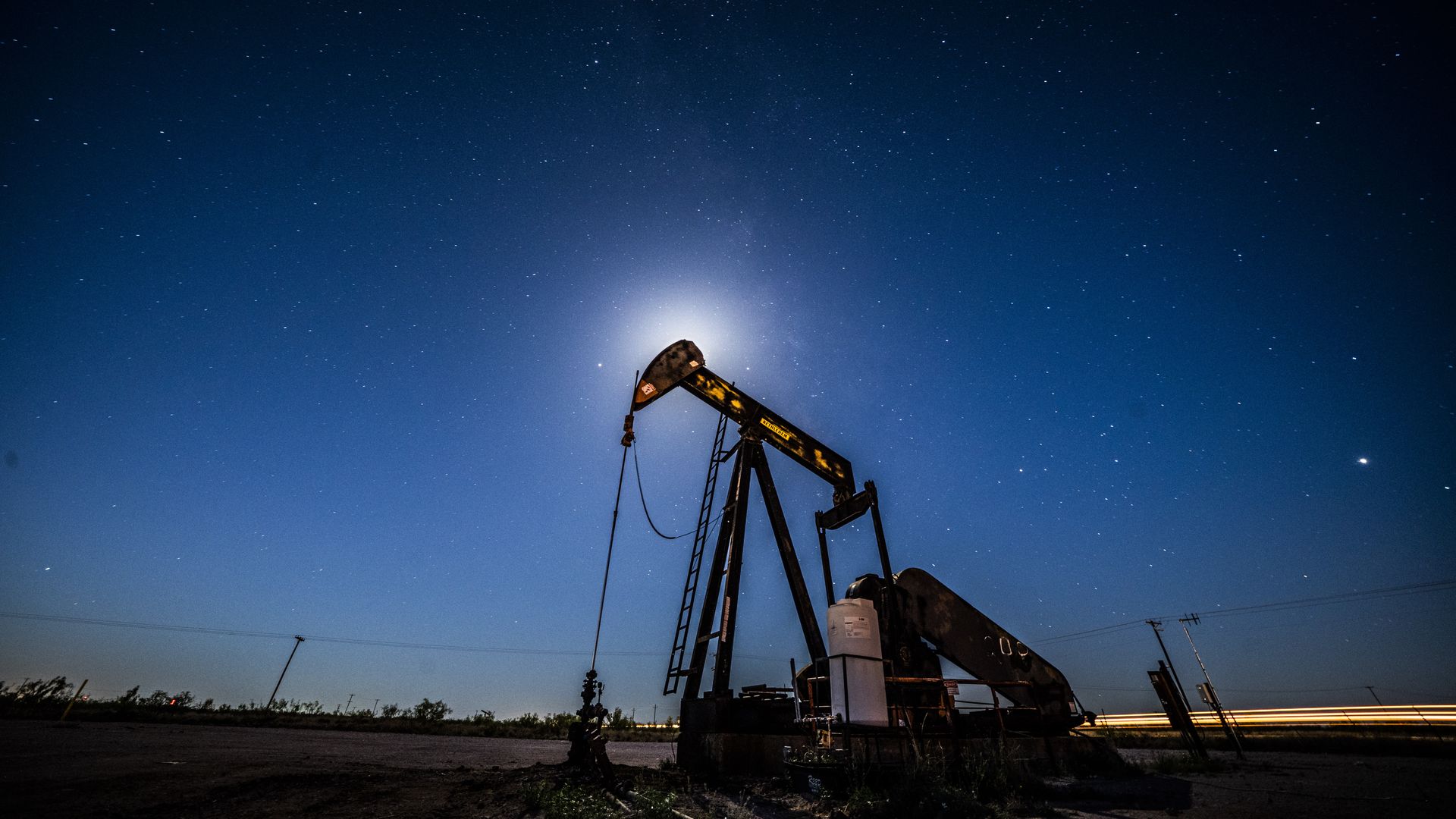Texas oil regulators poised to debate historic production controls
Add Axios as your preferred source to
see more of our stories on Google.

Workers extracting oil from oil wells in the Permian Basin in Midland, Texas. Photo: Benjamin Lowy/Getty Images
Texas oil regulators are likely to hold a hearing in April on whether to take the historic step to curb the state’s oil production amid a global market collapse fueled by the coronavirus.
Driving the news: Ryan Sitton, one of three commissioners of the Texas Railroad Commission, which oversees state oil production, told Axios that a hearing will likely be held soon in response to a renewed request earlier Monday from two oil companies to limit production as one way to stem the steep slide in global oil prices.
Why it matters: It matters today for oil industry jobs, which have grown much larger in number throughout the U.S. over the past decade as production has soared — largely in Texas. These jobs are now at risk of evaporating due to the price collapse and related recession.
- But it also matters later for everyone who drives gas-powered cars.
- Global oil prices are at historic lows, resulting in similarly rock-bottom gasoline prices. But experts warn this won’t last. “If oil is too cheap today, then it will be really expensive in the future,” Sitton said Monday.
The big picture: The oil industry is reeling from the one-two punch of the pandemic sapping oil demand for transportation and the price war between Russia and Saudi Arabia, which resulted in no agreement on controlling production among OPEC and Russia.
“This is a double black swan event. I don’t think anybody has ever seen it. It’s the worst I’ve seen,” Scott Sheffield, CEO of Pioneer Natural Resources, one of two companies requesting Texas limit production, told Axios Monday. “I’m worried about the industry being totally decimated.” (Parsley Energy is the other company asking).
- Sheffield, who has been in the industry for more than 30 years, also said he thinks a hearing will be likely, given conversations he’s had in recent days.
- He said his company and others received requests late last week from pipeline companies to shut in production, which changed the perspective of the commission.
Yes, but: Sitton said he supports holding a hearing, but is reserving judgment on whether the state should actually follow through on limiting production.
- Commission chair Wayne Christian has expressed several concerns about it, though he also said he is not outright opposed to the idea.
- A commission spokesperson declined to comment beyond receiving the request. “We have received the motion for hearing from Parsley Energy and Pioneer Natural Resources. We are currently reviewing the motion,” said R.J. DeSilva.
- The American Petroleum Institute, America's largest trade group representing the industry, has also expressed opposition to any sort of supply control.
The intrigue: The commission hasn’t held a hearing on controlling production — known as proration — in at least 50 years. “That said, the Railroad Commission did control the price of oil for the previous 50 years,” Sitton said.
- Oil prices have historically been at least partially controlled by governmental entities, Sitton said, whether it was the Texas regulator or, more recently, OPEC, the Organization of Petroleum Exporting Countries, based largely out of the Middle East.
One level deeper: President Trump spoke by phone Monday with Russian President Vladimir Putin about the pandemic and energy stability. Trump and his Cabinet have previously spoken with Saudi officials about the matter as well, but no agreement to curb production from those countries is emerging.
- Sitton said international collaboration is essential if Texas were to decide to limit production.
- “I think if us prorating was part of an international deal to balance markets, I think the odds are very good. If it’s purely a Texas thing and we’re operating totally on our own and no collaboration with anybody else, I think the odds are not zero but smaller.”
How it works: Commission hearings usually draw 100 or so people, and such a historic hearing on production limits could draw upwards of 10,000 people, Sitton said. He thinks the commission can find a way to do it digitally in order to comply with social distancing — which happens to be one of the root causes of the oil industry's problem itself.
